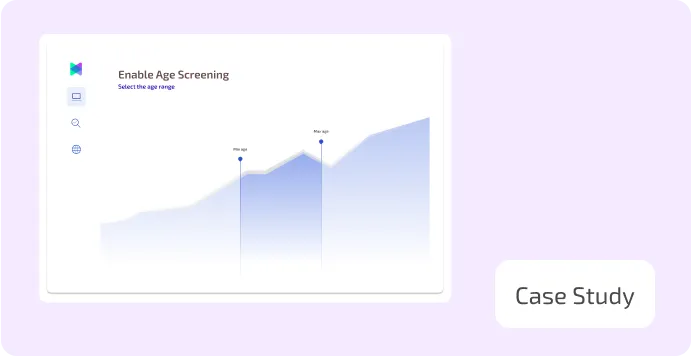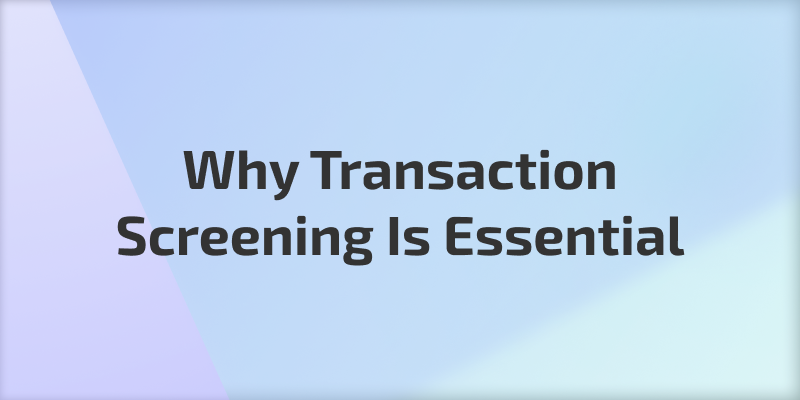.webp)
Published on
June 3, 2025
What is Address Verification Service (AVS): An Essential Guide for Financial Institutions
In this story

Comply quickly with local/global regulations with 80% less setup time
.svg)
.svg)
Accuracy and security are non-negotiable in financial transactions, and therefore, the Address Verification Service (AVS) is crafted for AML and fraud professionals in banks and financial institutions to stay accurate and keep their systems and customers safe and secure.
Unquestionably, the Address Verification Service is a popular fraud prevention method in general, but this is also particularly true for chargeback fraud and suspicious credit card transactions.
What is an Address Verification Service (AVS)?
Address Verification Service (AVS) is a tool designed to confirm the billing address provided by a cardholder against the address on file with the card issuer.
This address verification service check is essential in online and telephone transactions where physical card checks are impossible. AVS helps detect fraudulent activities by comparing the provided address with the one maintained by the card issuer.
Key Components:
- Integration with Payment Systems: Address Verification Services are integrated within payment gateways, enabling real-time address verification.
- Fraud Prevention: Cross-referencing address information assists in identifying potentially fraudulent transactions before they are processed.
Regulatory Requirements for Address Verification
Without Address Verification, criminals would have found it easier to impersonate someone else and that’s why AVS risk rules exist; to prevent identity theft and any related subsequent fraudulent activity that depends on this stolen identity like opening an account or conducting unauthorized money transactions. Which rules and regulations govern AVS?
1. Bank Secrecy Act (BSA)
Under the BSA, banks must do Customer Due Diligence (CDD) and Enhanced Due Diligence (EDD) for high-risk clients. This means they need to verify where their customers live to make sure they’re who they say they are and not involved in illegal activities.
Section 1020.220 of the BSA says that financial institutions need to have AML programs that include checking customer addresses.
2. EU’s 5th Anti-Money Laundering Directive (5AMLD)
The 5AMLD requires banks and financial institutions to thoroughly check their customers, including confirming their addresses.
Article 13 of the 5AMLD outlines the need to verify customers' addresses as part of the Know Your Customer (KYC) process.
3. Know Your Customer (KYC) Requirements
KYC rules are essential for confirming customers' identities to prevent fraud and financial crime.
- Customer Due Diligence (CDD)
As part of Customer Due Diligence, financial institutions need to verify customers' home addresses when they first open an account. Common ways to verify addresses include using government IDs, utility bills, and bank statements. These documents help confirm that the address a customer provides is correct.
- Enhanced Due Diligence (EDD)
For Enhanced Due Diligence, institutions not only need to verify the address but also gather more documentation to confirm the customer's identity and address.
4. FATF Recommendations
FATF Recommendation 10 states that institutions must perform thorough checks to verify both the identity and address of their customers.
Comply quickly with local/global regulations with 80% less setup time
.svg)
.svg)
Address Verification Service and Fraud Prevention
Address Verification Services can prevent different types of fraud like identity fraud for example.
Identity fraud happens when someone uses another person’s personal information to commit crimes, like stealing money or messing with accounts.
To stop this, you need to have strong ways to check who people are. One method is using Address Verification Services (AVS), which makes sure the address someone gives matches the one on file with their card issuer.
But that’s not all. It’s also important to use extra security steps like multi-factor authentication, which adds another layer of protection. You should also keep an eye on transactions for any strange activity and use advanced technology to spot and stop suspicious behavior.
Address Verification Service and False Positives
AVS isn't perfect; sometimes, it makes mistakes and wrongly marks a real transaction as fraud. This can happen because of errors or mismatches in the data.
When this happens, it can mean legitimate transactions get declined by mistake, which can frustrate customers and lead to lost sales.
To handle these issues well, companies need to set up good systems to review and manage AVS alerts. Using technology like machine learning can help them tell the difference between real and fake fraud more accurately.
Credit Card Verification Service and Address Verification Service
Credit Card Verification Service (CVS) is a system used to confirm that a credit card is valid and authorized for use. It ensures that the cardholder's information is correct and that the card has not been reported as lost or stolen. CVS typically involves several checks like Card Number Validation, Card Expiry Date CVV/CVC Verification, and Issuer Authentication.
Credit Card Verification Service and the Address Verification Service complement each other in securing credit card transactions despite having different focuses. While AVS focuses on verifying the cardholder's address, CVS focuses on the card's validity and security features.
To reduce fraud risk, AVS credit cards are commonly used with other security measures, such as card verification values. Also, AVS verification is a standard security measure in online transactions. An AVS fraud transaction alert signals that there is a mismatch between the provided address and the card issuer's records, warranting further investigation.
How Do AVS Codes Work?
The AVS address verification process involves comparing the entered billing address with the address stored by the credit card issuer to ensure authenticity. AVS codes are responses from the card issuer that indicate how closely the provided address matches their records. These codes guide financial professionals in assessing the legitimacy of transactions.
Code Format and Structure: AVS Response Codes
Format: AVS responses typically consist of single-letter codes.
Each AVS response code provides insight into the address verification status. Properly interpreting these codes is critical for effective transaction management.
- Y (Yes): The address matches the issuer’s records, indicating a lower risk of fraud.
- N (No): The address does not match, which may signal a fraudulent attempt or an error.
- U (Unavailable): Information is not available from the issuer, which could be due to system issues.
- Z (Zone Only): The ZIP code matches, but the address does not, often requiring further investigation.
Code Generation and Usage:
During a transaction, the payment gateway submits the billing address to the card issuer. The issuer then returns an AVS code reflecting the match status. This code informs whether the address aligns with the one on file, aiding in fraud detection and decision-making.
Steps Involved in AVS Authentication
Providing accurate AVS details during an online purchase can significantly reduce the risk of a transaction being flagged as suspicious.
1. Transaction Initiation: The customer enters their billing address.
2. AVS Check Process: The payment gateway forwards the address to the card issuer.
3. Verification and Response: The issuer checks the address and sends back an AVS code.
4. Final Decision: The merchant uses the AVS response, alongside other fraud detection tools, to decide on transaction approval.
Common AVS Codes Used
Understanding the common AVS codes and their meanings helps in making informed decisions.
- A (Address matches, ZIP code does not): Indicates that while the address is correct, the ZIP code is not.
- B (Address matches, ZIP code does not, but international): Used for international transactions where address validation is available but ZIP code checks are not.
- R (Address information not available): The address could not be verified, which might indicate issues with the issuer’s database.
Why Address Verification Services Matter
AVS is more than a tool; it is a crucial component in a strong fraud prevention strategy.
- Fraud Prevention: AVS helps reduce the risk of unauthorized transactions by confirming that the billing address matches the card issuer’s records.
Also, enabling AVS on credit card transactions allows businesses to reduce the likelihood of fraudulent purchases by verifying the billing address.
- Regulatory Compliance: AVS aids in meeting anti-money laundering (AML) and know-your-customer (KYC) requirements, contributing to the overall integrity of financial operations.
- Enhanced Security: Integrating AVS adds an extra layer of protection, reducing the chances of fraudulent transactions and chargebacks.
Pros and Cons of AVS
Limitations of Using an Address Verification Service (AVS)
Despite its advantages, AVS has limitations that must be acknowledged.
- Inaccuracies and False Positives: AVS may produce false results due to data entry errors or discrepancies in address records, potentially affecting transaction approval rates.
- Geographic Limitations: The effectiveness of AVS can vary globally. Some regions may have less comprehensive address verification systems.
- Technological Constraints: Integration issues and outdated systems can impact the accuracy and efficiency of AVS checks.
Best Practices for Implementing AVS
A large number of online retailers use credit card AVS to provide a secure platform for their customers, and if the credit card AVS check fails, then the transaction won't go through and it will most probably be flagged as well.
To maximize AVS effectiveness, follow these best practices:
- Ensure seamless integration of AVS with payment systems for accurate verification.
- Maintain up-to-date systems and address databases to reduce errors.
- Train staff on interpreting AVS codes and handling flagged transactions effectively.
Conclusion
An AVS system protects consumers and merchants by ensuring that credit card transactions are authorized based on address verification.
When a transaction is flagged for an AVS card check, it means that the system is cross-referencing the cardholder's address to prevent unauthorized use. Address Verification Service is especially useful for online and phone orders where you can't check the card itself.
Comply quickly with local/global regulations with 80% less setup time
.svg)
.svg)

How Aseel reduced onboarding time by more than 87% using FOCAL
Learn how FOCAL empowered Aseel to achieve new milestones.
.svg)
.svg)
Mastering Fraud Prevention: A Comprehensive Guide for KSA and MENA Businesses
51% of organizations fell victim to fraud in the last two years, don't be caught off guard, act proactively.
.svg)
.svg)
Featured blog posts
AI-Driven Precision in Fraud Risk and AML Compliance
.svg)
.svg)

.svg)
.png)




.svg)


.webp)


.webp)
.webp)


.svg)

_FastestImplementation_Small-Business_GoLiveTime.png)

_HighPerformer_Small-Business_HighPerformer.png)
_Leader_Leader.png)



%20(1).webp)